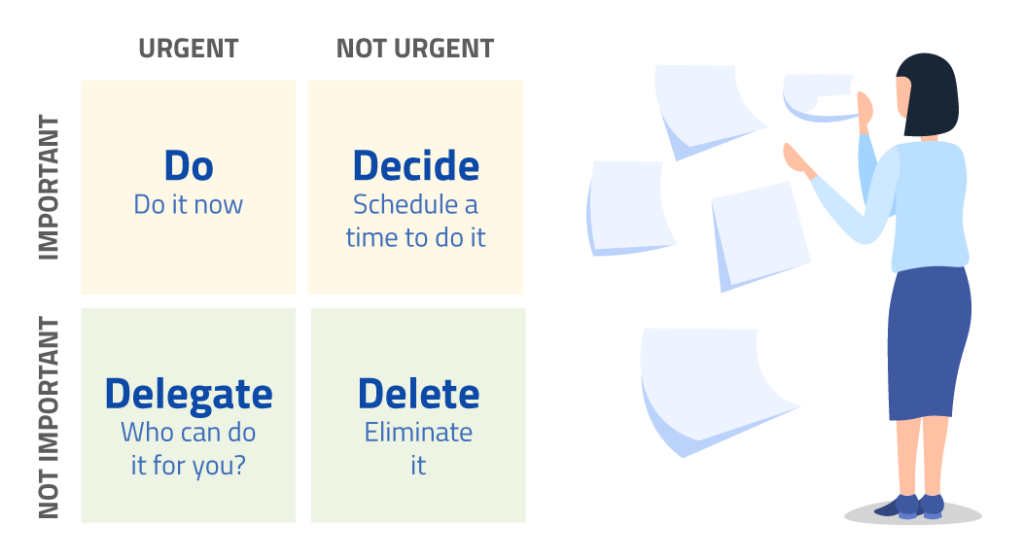Module 9 - Taking care of yourself
1. How not to burnout & how to enjoy the journey

“I find that I am much more creative when I’ve actually taken care of myself.”
– Arianna Huffington
Starting your own business is an extremely rewarding adventure. You find something you’re passionate about and you decide to give it everything. You get so committed to making it a success, you find yourself working more than you ever thought you could and under the kind of pressure you didn’t even know existed. It’s easy to fall into the trap of thinking that you should constantly be working, and you might even become addicted to it. But in reality, this is not a sustainable for your own wellbeing or for the success of your business.


Recent studies have shown that entrepreneurs are more prone to mental health issues due to tremendous amounts of stress, uncertainty, social isolation, and linking self-worth to their startup success (Forbes.com). So how do you go about ensuring you don’t burn out and find ways of taking care of yourself? This chapter may be slightly different from other startup guides, but we thought it was just as important as the others. If we are to make our food system more sustainable, we must make sure we are ourselves sustainable, too, so we can continue to create and transform the food system for the better.
Personal task management
One thing you need to get good at when running your own business is managing your own tasks.
You have so many things to do across so many different parts of the business, it can somewhat be overwhelming and often distracting. You get pulled from one side to the other, and before you know it it’s 5pm and you have ticked nothing off your original to do list. It doesn’t have to be this way. One tool you can use to manage your work is the Eisenhower Matrix, a simple quadrant model that helps you organise different tasks by whether they’re urgent/not urgent and important/not important:

You should focus on the first quadrant in your most productive time of the day: are you a morning person? Then you should do what’s important and urgent first, before you do anything else. Tasks that aren’t important but urgent? Ideally you want to delegate them to someone else though this is not always the case as a startup founder, so you may need to schedule them for another time. Important but not urgent? Schedule a set amount of time for you to do this and don’t spend longer than you allocated. Not important and not urgent? Ask yourself why this is on your to do list in the first place!
Other useful tips we’ve gathered along the way:
- Take advantage of online organisational tools available like Basecamp, Trello or Asana. There are plenty to go around so spend a bit of time researching what suits your needs and preferences best.
- Plan your week in advance and plan your day the evening before. Set 2-3 key tasks you want to achieve each day and start your day with them, your emails can wait.
- Take breaks! Get up, move around, go outside to breath some fresh air or have a cup of tea. You’ll be much more efficient when you’ve done that.
- Turn off notifications on your phone and laptop when you want to focus, or better yet at all times.
Getting more out of yourself
There is no doubt your startup will consume most of your life but finding balance will keep you sane and make you and your business more likely to be successful. Let’s be realistic, this won’t look like “traditional” work life balance where you spend half your time working and half enjoying the finer things in life. But it’s really important you keep carving out time to take care of yourself. Have other things going on whether it’s a sport, mindfulness, painting or cloud spotting… Whatever floats your boat and gets you focusing on something else once in a while.

Other useful tips we’ve gathered along the way:
- Get better at saying no: it’s flattering to be approached for all sorts of reasons, but you can’t say yes to everything. Learn how to and when to say no.
- Be output focused: no one is counting your hours. The only thing that matters is delivering the results that your business needs. So, working hard but on things that are not of value won’t win you anything. Being busy is not the same as being productive.
- Learn how to manage your time vs managing your energy: to be productive and balanced in your work, get better at managing your energy. “The core problem with working longer hours is that time is a finite resource. Energy is a different story” (hbr.org). Identify what practices drain you and what energises you so you’re always bringing the most of yourself to work. (Read more about managing energy vs time in this Harvard Business Review article and find 5 quick tips on how do it here).
- Appreciate your wins: you may have picked up that starting a business is stressful and hard work by now. The way is paved with challenges and setbacks. That is why it’s so important to acknowledge when things go right. It can be easy to minimise wins and focus on your ever growing to do list so make sure you take time to enjoy successes as they’ll give you energy to take on the next challenge.
- Declutter: Make sure you regularly declutter your to do list. Stop and reflect on what you’re spending your time on, and cull what is not essential.
Self-identity
Remember that you are not your startup. You’re putting so much of yourself into it, and being an entrepreneur quickly becomes a label that others put on you and that you adopt yourself. From that perspective, it’s hard for your startup not to become your whole identity but try to not let this happen. It’ll make it harder for you to make rational decisions about the business and it also means you’ll feel down during times of hardship. As for all the other entrepreneurs and businesses you’re seeing online who look like they’ve got it all figured out? It’s all nonsense. People portray their best selves online, it’s the same for businesses. Take everything you see with a pinch of salt and don’t compare yourself or your progress to others, there is nothing to gain from it.
Making decisions
Making decisions is tiring. It’s especially tiring when you’re responsible for every decision. Former President Obama used to joke that when he was done with the White House, he would start a shop that only sold white t-shirts in one size so that he wouldn’t have to make more decisions. Decision-making fatigue exists! Given that being a founder requires constant decision making, it’s important to have a strategy for not burning out. For example, you can delegate some decision making (does it matter where the team goes for lunch?) and make sure to lean on others as much as necessary (e.g.: advisers, when making important decisions).
Mastering the different aspects described in this manual
Everything we’ve told you in this guide is to help you get your business off the ground successfully but the only way it will survive is if you survive. The sum of all of the things you need to do may seem huge but broken down, you can see they’re all manageable chunks.
- Nail your proposition: do this by conducting in depth market research, implementing lean startup mentality and developing a product or service that truly meets customer needs. When you know you have a strong proposition, you won’t second doubt yourself when things inevitably go wrong.
- Do things right: make sure you do things according to local legislation as not doing so will inevitably come back to haunt you sooner or later and may have personal implications on your financial wellbeing. You’ll sleep much better at night when you know you’re complying with legal requirements and that you’ve taken steps to protect your business and personal interests where appropriate.
- Be wise with cashflow and raise more money than you think you’ll need: make sure you have funding plans in place and that you’re managing your money wisely. You don’t want to find black holes suddenly and find yourself not being able to pay your staff. Trust us, your stress levels will go way down when you’ve got good oversight of your financial situation.
- Be a great story teller: bring people along with you on your journey, focus your message and concentrate your efforts on those most critical. You can’t win everyone over and trying to will bring you down.
- Surround yourself with great people: Take time to hire wisely and build a wider team of people (this includes advisors, board members, investors) who can help move your business along and provide support you’ll need. They say it takes a village to raise a child, it’s the same for startups.

